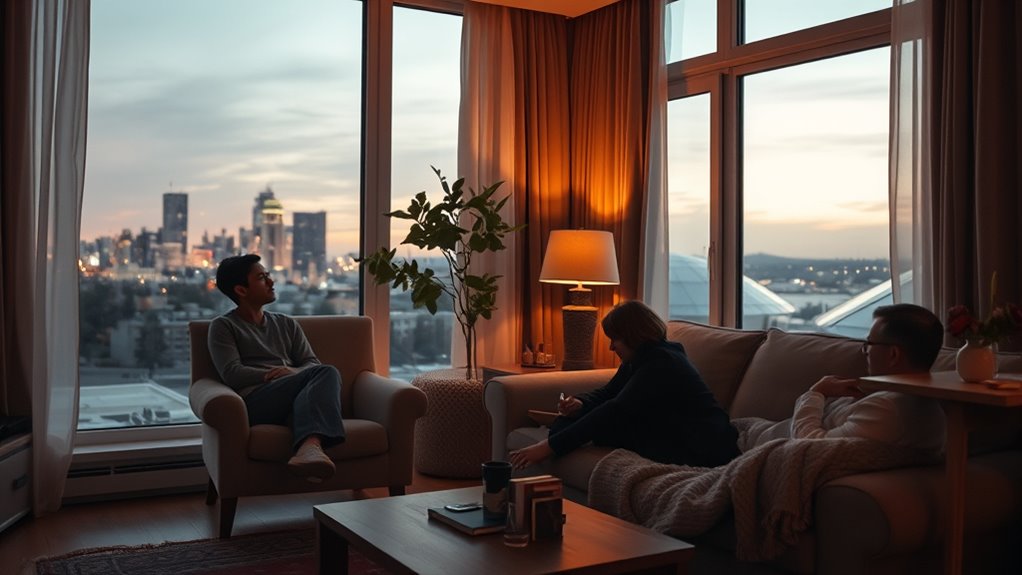When your partner needs space, trust plays a key role in balancing distance and intimacy. Show that you understand and respect their need for personal time by communicating openly and honestly. Reassure them of your commitment and set clear boundaries together, fostering mutual understanding. Support emotional well-being by prioritizing self-care and comfort. If you stay attentive to these aspects, you’ll create a safe space where both of you can grow while staying connected. Keep exploring how trust and communication can strengthen your bond.
Key Takeaways
- Foster trust through open, honest communication to reassure your partner that needing space doesn’t threaten the relationship.
- Establish clear boundaries collaboratively, ensuring both partners feel respected and understood during periods of distance.
- Practice active listening and empathy to validate feelings and reduce misunderstandings about the need for space.
- Support emotional well-being with self-care and comfort measures, maintaining physical and mental resilience during separation.
- Reaffirm commitment regularly to strengthen trust and reassure your partner of your ongoing connection despite physical distance.

Maintaining a healthy balance between distance and intimacy is essential for strong relationships, yet it can often feel like walking a tightrope. When one partner needs space, it’s natural to feel uncertain or even worried about how it might impact your connection. However, maneuvering this dynamic skillfully requires focusing on trust building and honing your communication skills. Trust forms the foundation that allows both of you to feel secure even when apart. You need to believe that needing space isn’t a reflection of dissatisfaction or a threat to your bond, but rather a healthy aspect of personal growth and individual needs. To nurture this trust, you must be open and honest about your feelings. Express why you value your partner’s need for space and reassure them of your commitment. When you communicate clearly and compassionately, you reduce misunderstandings and create a safe environment where both of you can share openly.
Healthy relationships balance distance and closeness through trust and honest communication.
Effective communication is more than just talking; it’s about listening actively and responding with empathy. When your partner expresses the need for distance, resist the urge to respond defensively or with frustration. Instead, listen carefully to what they’re saying and ask questions if you need clarity. Demonstrating that you understand their perspective helps deepen trust and shows that you respect their boundaries. Likewise, share your feelings honestly without blame or criticism. If you’re feeling anxious or insecure, communicate those emotions calmly and without guilt. This openness encourages your partner to do the same, fostering a balanced exchange that respects both your needs. Additionally, understanding the importance of home furnishings like mattress toppers and heated mattress pads can contribute to your comfort and well-being during times of emotional distance, helping you feel more secure and cared for.
Remember, balancing distance and intimacy isn’t about one person giving more while the other takes; it’s about mutual understanding. Establish boundaries together and agree on what “space” means for both of you. This collaborative approach ensures that neither of you feels abandoned or overwhelmed. Use your communication skills to check in regularly, not just about logistics but about how each of you feels emotionally. This ongoing dialogue helps prevent misunderstandings and reassures you both that your connection remains strong despite the distance.
In the end, trust building and communication are your greatest tools. When you approach your partner’s need for space with patience, honesty, and compassion, you create a resilient foundation that can withstand the challenges of balancing distance and intimacy. You’ll find that giving each other room to breathe actually brings you closer, reinforcing the trust and understanding that keep your relationship healthy and thriving.
Frequently Asked Questions
How Can I Tell if My Partner Genuinely Needs Space or Is Considering Ending the Relationship?
You can tell if your partner genuinely needs space or is considering ending the relationship by noticing signs of detachment, like less communication or emotional distance. If they start expressing concerns about the relationship or seem withdrawn, it might indicate they need time. Pay attention to their actions and words—if they seek distance but still show care, they likely need space, not an end. Open, honest conversations help clarify their true feelings.
What Are Some Healthy Ways to Cope With Feelings of Rejection During This Period?
When you feel rejected, focus on self-care strategies like journaling, exercising, or talking to a friend. Practice emotional validation by acknowledging your feelings without judgment, reminding yourself that it’s normal to feel hurt. Give yourself space to heal and avoid blaming yourself. Reframe the situation as an opportunity for growth, and remember that your worth isn’t defined by your partner’s need for space.
How Long Should the Distance Last Before Reassessing the Relationship?
You should reassess the relationship when the timing considerations and emotional readiness align, usually after a few weeks to a month. Think of it as tending a garden—patience, nurturing, and observation help you understand when growth is ripe. During this period, focus on your feelings, monitor your emotional health, and communicate openly. When both of you feel prepared, it’s time to reflect, reconnect, and decide on the next steps.
Can Physical Distance Strengthen Our Emotional Connection?
Yes, physical distance can strengthen your emotional connection by fostering trust building and emotional resilience. When you take time apart, you create space to reflect on your feelings, reducing dependence and encouraging personal growth. This distance allows both of you to appreciate each other’s strengths and develop deeper understanding. As trust builds and emotional resilience grows, your bond becomes more resilient, making your relationship stronger and more meaningful over time.
What Are Common Mistakes to Avoid When Giving a Partner Space?
When giving your partner space, avoid common mistakes like ignoring their boundaries or becoming overly clingy. Respect their need for distance and communicate openly about what they need. Don’t bombard them with messages or demands; instead, trust their process. Stay patient and supportive, showing you understand their desire for space. This helps maintain trust and prevents misunderstandings, fostering a healthier balance of independence and intimacy in your relationship.
Conclusion
Remember, finding the right balance between space and closeness keeps your relationship strong. Giving your partner some room can actually boost trust and intimacy over time. Did you know that couples who respect each other’s need for space report 40% higher satisfaction in their relationship? So, trust the process, communicate openly, and give each other the freedom to grow. That way, you’ll build a healthier, happier connection that lasts.









